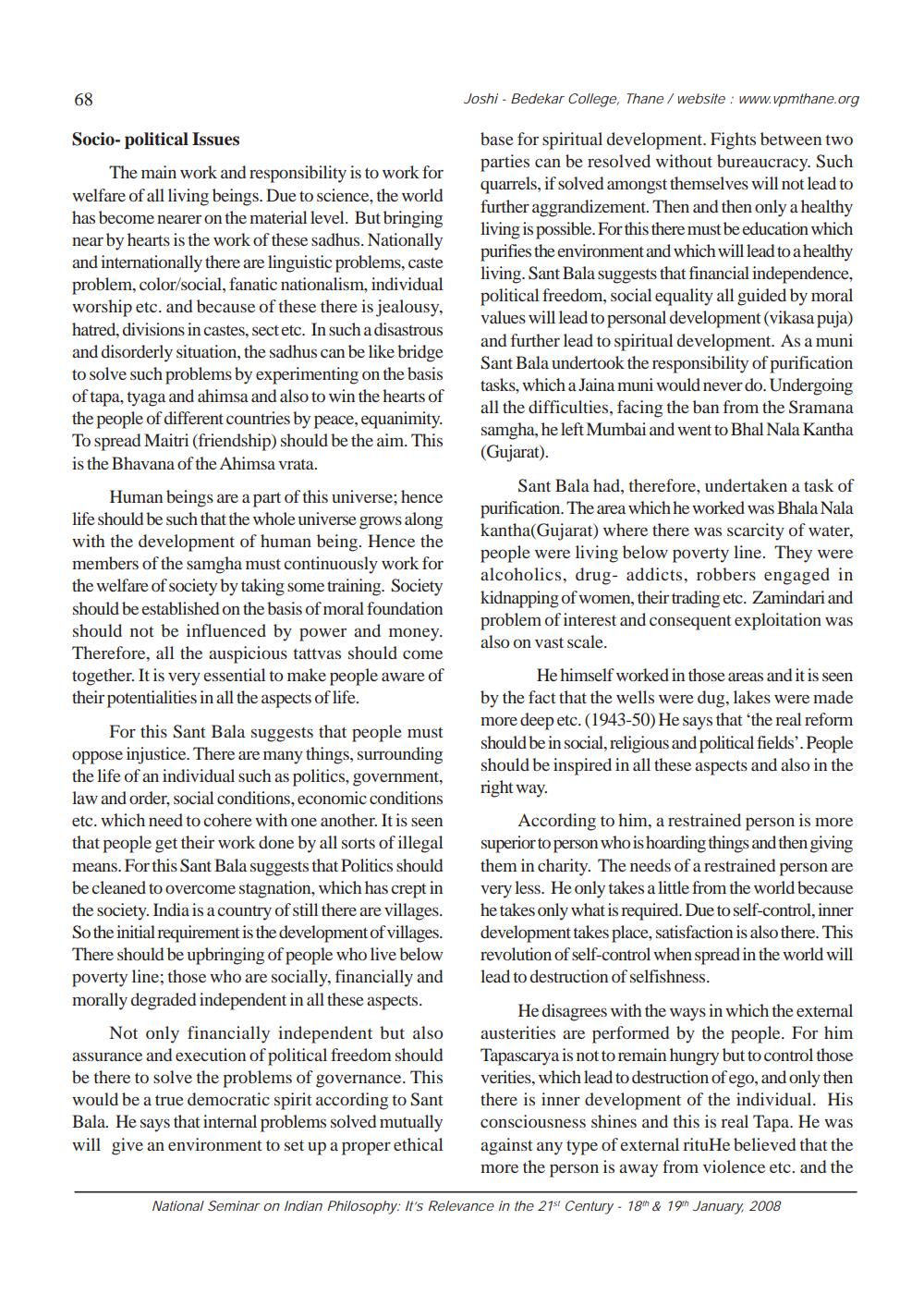Book Title: Indian Philosophy in 21st Century Jaina View Author(s): Kamini Gogri Publisher: Kamini Gogri View full book textPage 3
________________ 68 Socio-political Issues The main work and responsibility is to work for welfare of all living beings. Due to science, the world has become nearer on the material level. But bringing near by hearts is the work of these sadhus. Nationally and internationally there are linguistic problems, caste problem, color/social, fanatic nationalism, individual worship etc. and because of these there is jealousy, hatred, divisions in castes, sect etc. In such a disastrous and disorderly situation, the sadhus can be like bridge to solve such problems by experimenting on the basis of tapa, tyaga and ahimsa and also to win the hearts of the people of different countries by peace, equanimity. To spread Maitri (friendship) should be the aim. This is the Bhavana of the Ahimsa vrata. Human beings are a part of this universe; hence life should be such that the whole universe grows along with the development of human being. Hence the members of the samgha must continuously work for the welfare of society by taking some training. Society should be established on the basis of moral foundation should not be influenced by power and money. Therefore, all the auspicious tattvas should come together. It is very essential to make people aware of their potentialities in all the aspects of life. For this Sant Bala suggests that people must oppose injustice. There are many things, surrounding the life of an individual such as politics, government, law and order, social conditions, economic conditions etc. which need to cohere with one another. It is seen that people get their work done by all sorts of illegal means. For this Sant Bala suggests that Politics should be cleaned to overcome stagnation, which has crept in the society. India is a country of still there are villages. So the initial requirement is the development of villages. There should be upbringing of people who live below poverty line; those who are socially, financially and morally degraded independent in all these aspects. Not only financially independent but also assurance and execution of political freedom should be there to solve the problems of governance. This would be a true democratic spirit according to Sant Bala. He says that internal problems solved mutually will give an environment to set up a proper ethical Joshi - Bedekar College, Thane / website: www.vpmthane.org base for spiritual development. Fights between two parties can be resolved without bureaucracy. Such quarrels, if solved amongst themselves will not lead to further aggrandizement. Then and then only a healthy living is possible. For this there must be education which purifies the environment and which will lead to a healthy living. Sant Bala suggests that financial independence, political freedom, social equality all guided by moral values will lead to personal development (vikasa puja) and further lead to spiritual development. As a muni Sant Bala undertook the responsibility of purification tasks, which a Jaina muni would never do. Undergoing all the difficulties, facing the ban from the Sramana samgha, he left Mumbai and went to Bhal Nala Kantha (Gujarat). Sant Bala had, therefore, undertaken a task of purification. The area which he worked was Bhala Nala kantha(Gujarat) where there was scarcity of water, people were living below poverty line. They were alcoholics, drug- addicts, robbers engaged in kidnapping of women, their trading etc. Zamindari and problem of interest and consequent exploitation was also on vast scale. He himself worked in those areas and it is seen by the fact that the wells were dug, lakes were made more deep etc. (1943-50) He says that 'the real reform should be in social, religious and political fields'. People should be inspired in all these aspects and also in the right way. According to him, a restrained person is more superior to person who is hoarding things and then giving them in charity. The needs of a restrained person are very less. He only takes a little from the world because he takes only what is required. Due to self-control, inner development takes place, satisfaction is also there. This revolution of self-control when spread in the world will lead to destruction of selfishness. He disagrees with the ways in which the external austerities are performed by the people. For him Tapascarya is not to remain hungry but to control those verities, which lead to destruction of ego, and only then there is inner development of the individual. His consciousness shines and this is real Tapa. He was against any type of external rituHe believed that the more the person is away from violence etc. and the National Seminar on Indian Philosophy: It's Relevance in the 21st Century - 18th & 19th January, 2008Page Navigation
1 2 3 4
